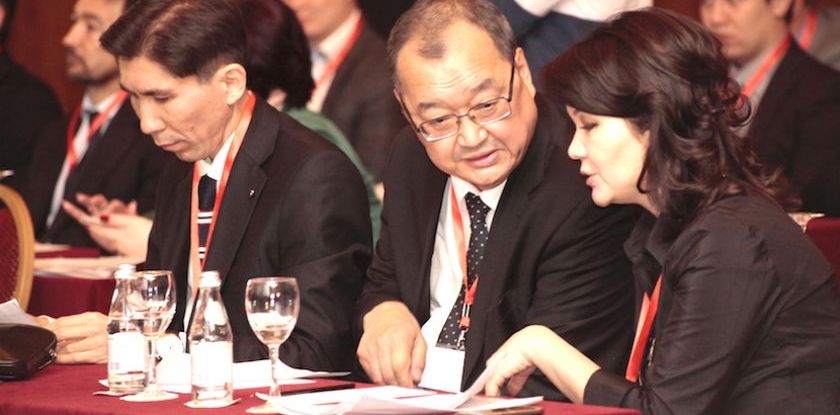The state of affairs in the banking system of Kazakhstan has, on one hand, stabilized which is confirmed not only by the statements of the National Bank’s top-management and the agency’s statistics but also by the assessments of the international rating agencies. On the other hand, however, it is acquiring the a criminally punishable and scandalous-hysteric nature.
The reasons for the latter are clear: the two key state agencis (the National Bank and the Security Council) are toughening the means to collect the debts from the shareholders and concurrently borrowers of BRK Bank, Bank of Astana, and Qazaq Banki.
As a result of their efforts, a number of people have found themselves behind bars (list not exhaustive):
- Zhomart Ertayev, former freelance advisor of RBK Bank’s Chairman, from September 2016 Chairman of Alma Group LLC, from May 2017, head of Troika-D Bank JSC and Volgo-Okskiy Kommercheskiy Bank JSC;
- Tatyana Pak, Director and a major participant of Asset Invest LLP (previously Ordabasy Communication LLP);
- Erkyn Amirkhanov, former Chairman of Eksimbank;
- Bakhyt Ibragim, former advisor of Chairman of RBK Bank, Qazaq Banki shareholder.
Most likely, this list will not be limited to these persons. Simply because it is quite easy, in such cases, to “cook up” some organized criminal groups. And it is precisely what the Kazakhstan law-enforcement agencies have been doing in the recent years having sharpened their skills through the unorecedented in the Kazak history BTA Bank case.
Based on the insider information, the only one who will avoid such fate is Dinmukhamet Idrisov, the co-farther-in-law of Head of the Lower House of the Parliament Nurlan Nigmatullin. But his luck does not only have to do with his family connections and the fact that he stopped being an RBK Bank shareholder in November 2017 (granted, he still had shares in Qazaq Bank). There is talk that Idrisov managed to collect about $300 mln and thus paid the damages.

Perhaps this successful outcome has something to do with the fact that the Kazakhstanskiye Kommunalnyye Seti group that belonges to Dinmukhamet Idrisov has been able (or forced) to borrow back from the Sberbank International Group. Even though the amount borrowed was less than what they were counting on (not more than $230 mln as opposed to $400 mln) but half a loaf is better than none.
One way or another, Zhomart Ertayev and his allies’ attempts to put the responsibility for Bank RBK’s problems on Idrisov will most likely be unsuccessful.

And, judging by the fact that the National Security Council of Kazakhstan has arrested Erkyn Alirkhanov who is on the richest Kazakhs list according to the Forbes magazine, his closest partner Alexander Klebanov might follow him to prison as well.

And it is unlikely that Klebanov’s urgent retirement from the position of Bank Astana’s Chairman will save him. On the other hand, his close business ties with Nursultan Nazarbayev’s eldest daughter Dariga whose interests he represents in different projects may play to his advantage.

However, it looks like even if Klebanov pays his debts in an urgent manner, it will not save him from the wrath of the authorities.
We believe that not only the shareholders and the top-management of the problem financial institutes but also Akorda itself is to blame for what is happening in the Kazakhstan banking sector. The problems of the sector have been and still remain the general ones, in other words, they affect all its participants without exception, but some of them have overcome the problems independently while, out of those who required the state support, Akorda saved only six banks that were “closest” to it.
Note that the biggest state support was given to:
- Halyk Bank that bought for two tenge Kazkommertsbank that had been previously pumped with 2.4 trillion of the state resources via BTA Bank;
- Tsesnabank (100 bln tenge);
- Bank Tsentrcredit (60 bln);
- Eurasian Bank (150 bln tenge);
- ATF Bank (100 bln);
- RBK Bank (was added later and in an urgent manner; after assisting this bank, the state purse was closed).
Thus, the crucial problem of the problem banks’ co-owners lies in the fact that, with all their closeness to Akorda, they have turned out to be less influential than their competitors. The fact that the state authorities’ abilities to support the oligarch allies have been seriously reduced since 2008 also plays a significant role in it.
Therefore, the Kazakhstan banks have de-facto been divided into three basic groups: the super-systemic ones, the systemic ones, and the non-systemic ones.
The first group includes only Halyk Bank belonging to Dinara and Timur Kulibayevs.
The second includes the five banks that received the state support last year, and all of them without exception are controlled by President Nazarbayev’s closest relatives and allies.
The third group includes the rest of the financial institutes. Therefore, they will be the ones to be “forced” off the market so the first two groups feel more comfortable in it.




